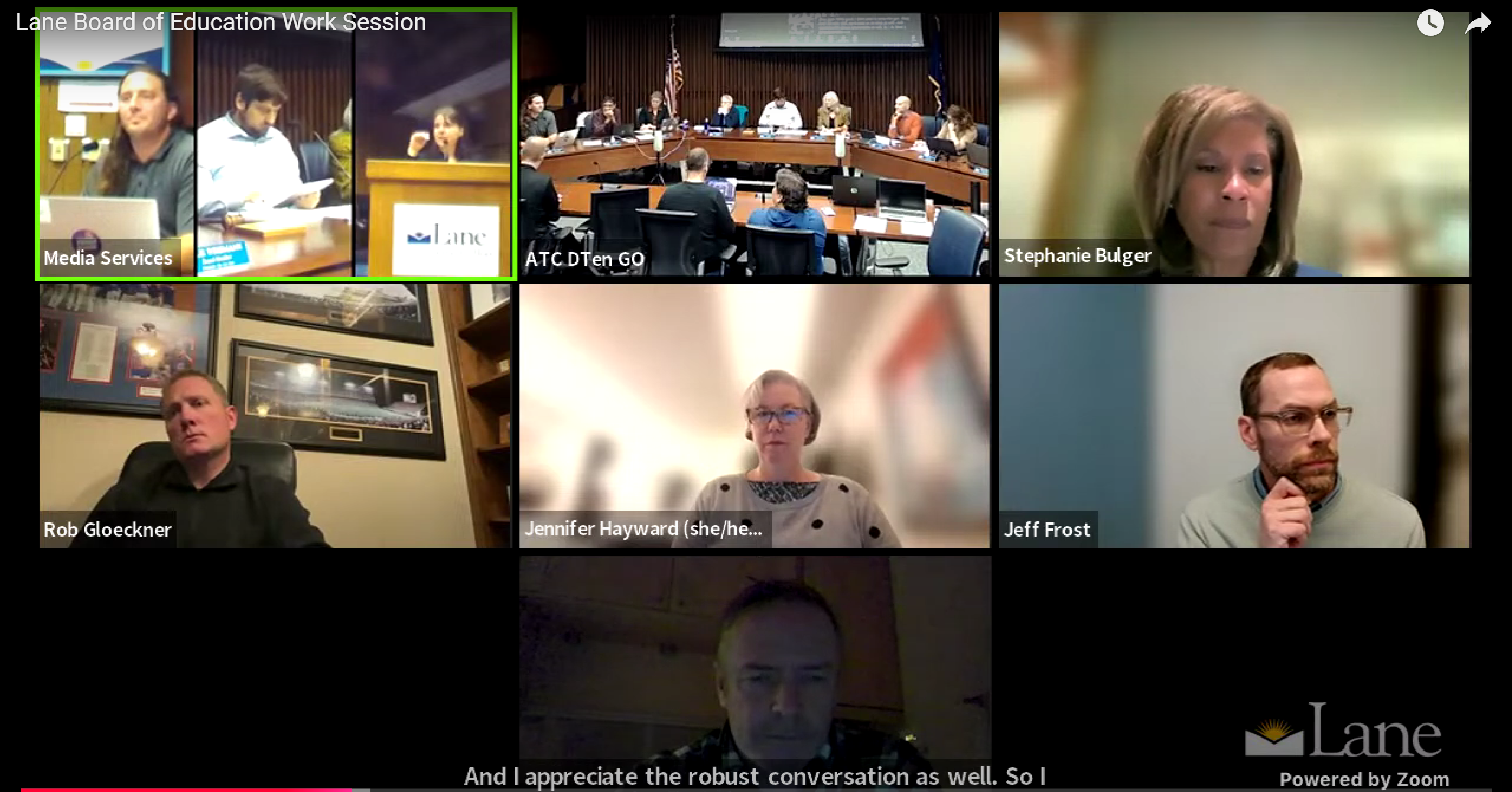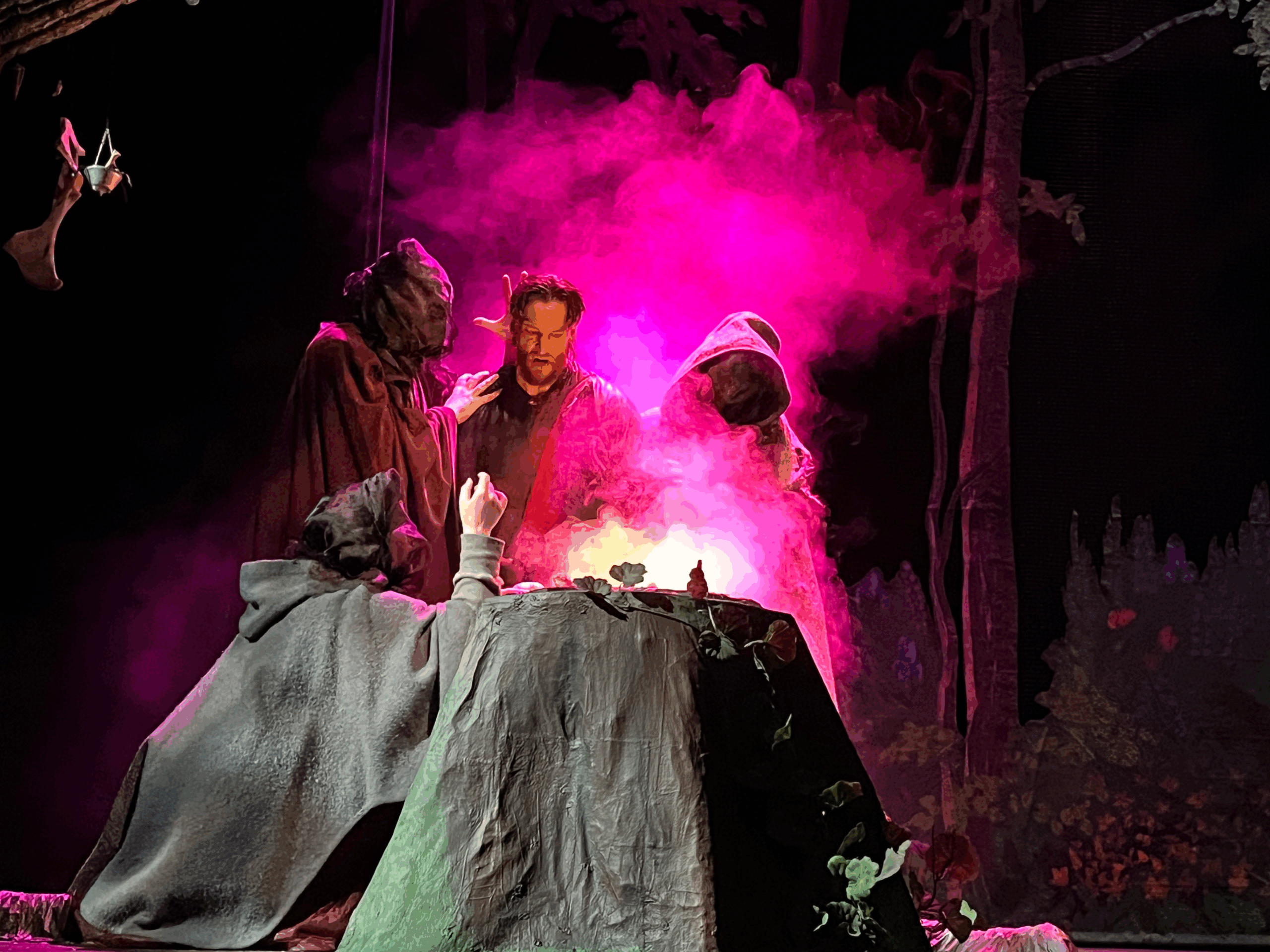LCC’s Board of Education discusses grass versus artificial turf for the baseball field and a future discussion of land acknowledgments during meetings at it’s Oct. 22 work session
Lane Community College Board Work Session 10/22

On Tuesday, Oct. 22, Lane Community College’s Board of Education met for a Board Work Session.
On the docket was a program spotlight from LCC Athletics Director Greg Sheley, a panel discussion with expert guests from the community to weigh the pros and cons of artificial turf vs. natural grass for a new baseball field, discussion about land acknowledgments during meetings, and an announcement from a board member who is stepping down to take another elected position in the Oregon state Legislature.
To start things off, Sheley gave a presentation detailing the athletics program’s successes, challenges, and finances over the last two years.
Sheley highlighted to the board that “LCCs student-athletes have been excelling both on and off the field,” with students succeeding academically. All 10 of Lane’s athletics teams qualified for postseason play in 2024 for the first time since 1984.
Those teams include basketball, volleyball, baseball, soccer, and track and field.
Sheley then spoke to the board about the pressing need for a new baseball field since the current field has failed and must be replaced.
Sheley said, “Lane’s current baseball team has been unable to practice or play on a real baseball field.”
Titans baseball has only been able to practice at off-site hitting facilities at local high schools during limited hours on Sundays and Wednesdays or on the soccer pitch at LCC, which, as Sheley said, “is not conducive to the student-athlete experience.”
In addition, the baseball team members have been forced to take their classes online, so they are not getting the full on-campus experience as their peers in other sports.
Sheley said, “this puts the baseball team at a disadvantage, as well as unnecessary risk, since the athletes must spend extra time and money commuting to practices off-site.”
Sheley then gave the rest of his time to three student-athletes from men’s and women’s basketball and track who had prepared statements.
“I chose to come to Lane primarily for the outstanding basketball program,” said Micah Wicks, a student athlete on Lane’s basketball team. “Right now I am studying business management, and I hope to transfer to a 4-year university next year.”
Piper Wise-Cruz described being dedicated to running track and field and how, after high school, “she thought her athletics career would be coming to an end since she didn’t think she had the potential to continue with athletics in college.”
Wise-Cruz said, “I was ready to call it quits with track (after) my senior year (of high school), thinking I didn’t have what it takes to continue on to the college level, and Lane has brought that to me in the biggest and best way possible.”
Wise-Cruz spoke of how LCC coach and former Olympian Kelly Blair has “been an inspiration” and how Blair has encouraged her to go after her “big goals” and pursue athletics at a 4-year university.
Noah Salmon then described how he had come to the area from California to attend LCC for basketball and the physical therapy program. Initially, he had not been expecting much from a community college. Once he visited Lane’s campus, however, his perspective changed. Salmon said that compared to the California junior colleges he visited, Lane Community College “just stood out to me as a great environment and somewhere where I could thrive.”
Salmon also highlighted the importance of having access to the gym 24/7, the basketball equipment that supports him as a student-athlete, and the support he receives from his coaches, including a Thanksgiving meal they hosted for students who could not go home to their families.
After wrapping up student statements, board member Austin Folnagy asked Sheley about “opportunities to continue making Lane Community College a hub for athletics in the community.”
Sheley explained that by building a playable baseball field, LCC would be able to partner with organizations in the community to continue to expand that idea of being an athletics hub, not just for students, but for the community as well.
This led to a panel discussion with knowledgeable community members on the pros and cons of artificial turf vs. grass for a new baseball field. The panel included Allan Benavides, general manager of Eugene Emeralds Professional Baseball Club, and Matt Koehler, principal landscape architect for Cameron McCarthy.
To start off the discussion, the board members prepared a list of questions, which the panel then took turns addressing.
Board members and LCC student body representative Sophie Gibson had a wide range of questions and concerns for the panelists around player safety, environmental impacts, timeline of project completion, and the initial investment and maintenance costs of both methods.
Sheley and Gibson also made clear to the board that, for LCC students, the timeline of completion and the wise use of the students’ resources are two of the most important considerations when making this decision.
“If the Board of Education decides to go ahead with a grass turf baseball field, it could take up to two years to become fully established and playable,” according to Koehler.
This timeline would mean that LCC’s baseball team would no longer have a space to practice and play after this season until the new grass field is ready for play.
After the current season, Sheley explained, “the baseball team will no longer be able to use the same spaces in the community to practice that they have been as those contracts are ending, and they have not been able to find another alternative in the community.”
An artificial turf field, however, could be installed and ready for athletes by August 2025, ensuring that LCC baseball players could practice and play next season without interruption.
Perhaps the most outspoken voice of doubt toward artificial turf belonged to board Chair Zach Mulholland, who had prepared a long list of concerns, complete with links to online articles and studies, which he had emailed to the board ahead of the meeting.
Mulholland was particularly concerned about the potential environmental impacts of chemicals such as 6PPD, PFAS, and microplastics.
Additionally, Mulholland brought up concerns over how heat interacts with artificial turf fields and could potentially be more dangerous for players than grass turf on hot days, as well as potential increases in player injuries due to differences in how the turf reacts to being played on.
During the discussion, it was found that not all options for infill materials had been explored, with sustainable options for infill materials like cork remaining unexplored.
When board member Steve Mital questioned why that was the case, Koehler responded, “I think what probably drove it is that we presented the design that was placed at PK park based on ball play and success there, and knowing that there were cost constraints here; that may have been negative on my part, not presenting that to Tom and Jennifer as ‘hey, there are these other options you can go with,’ just knowing that there were budget constraints, to try to get this project moving forward.”
The board then discussed the possibility of visiting Oregon State University to look at a recently installed artificial turf field with a sustainable alternative infill material.
The board then discussed the wording and intention of land acknowledgements at the beginning of meetings, an ongoing topic.
Board member Lisa Fragala said, “I think this is a topic that has a long history of good intentions from the board, that has been predominantly white and of European heritage. I think we’ve received numerous feedback and requests to re-evaluate over the last couple of years.”
She continued, “So rather than defer an important conversation, which I think can have important impacts on some of the students and community here, I think it might be more important to bring it back as a longer conversation.”
Or, she stressed, “to bring it back and discuss if we want to put it out there for students, faculty and staff in the community to provide the board with feedback as Austin (Folnagy) suggested.”
She concluded that the board has “heard repeatedly that it’s time to reevaluate, and I think that would be beneficial.”
Fragala will be stepping down as she takes office, representing House District 8 in the Oregon Legislature.



